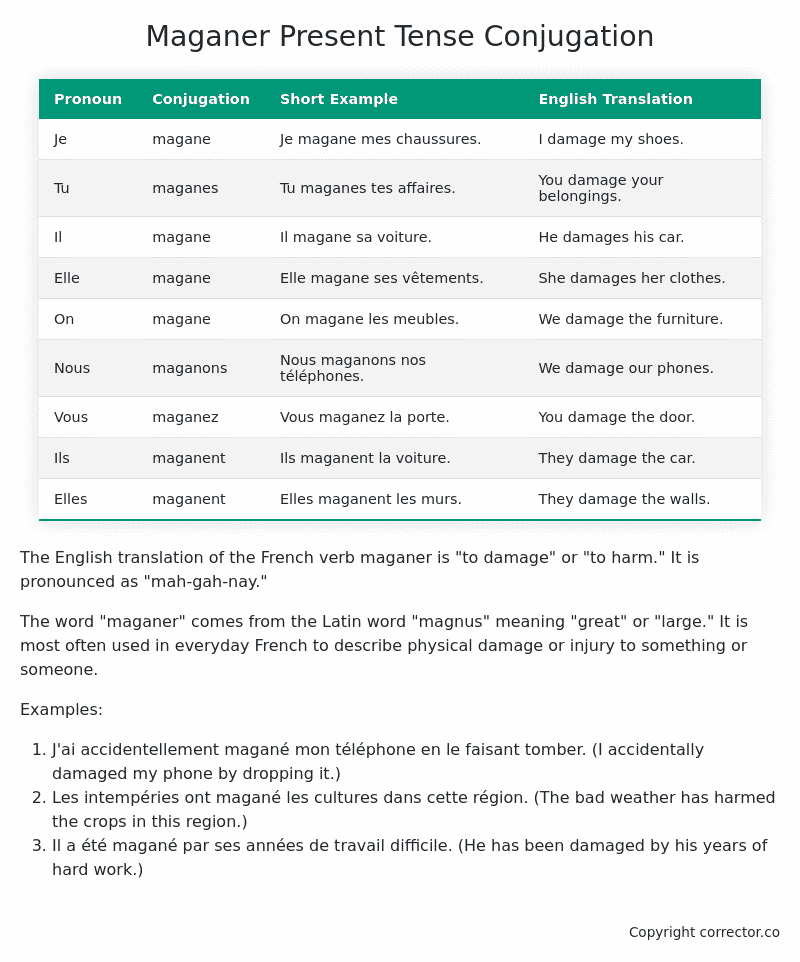Le Present (Present Tense) Conjugation of the French Verb maganer
Introduction to the verb maganer
The English translation of the French verb maganer is “to damage” or “to harm.” It is pronounced as “mah-gah-nay.”
The word “maganer” comes from the Latin word “magnus” meaning “great” or “large.” It is most often used in everyday French to describe physical damage or injury to something or someone.
Examples:
- J’ai accidentellement magané mon téléphone en le faisant tomber. (I accidentally damaged my phone by dropping it.)
- Les intempéries ont magané les cultures dans cette région. (The bad weather has harmed the crops in this region.)
- Il a été magané par ses années de travail difficile. (He has been damaged by his years of hard work.)
Maganer – About the French Present Tense
To take a deep dive into all the French tenses then see our article on Mastering French Tense Conjugation.
Common Everyday Usage Patterns For Le Present
Interactions with Other Tenses
Table of the Present Tense Conjugation of maganer
| Pronoun | Conjugation | Short Example | English Translation |
|---|---|---|---|
| Je | magane | Je magane mes chaussures. | I damage my shoes. |
| Tu | maganes | Tu maganes tes affaires. | You damage your belongings. |
| Il | magane | Il magane sa voiture. | He damages his car. |
| Elle | magane | Elle magane ses vêtements. | She damages her clothes. |
| On | magane | On magane les meubles. | We damage the furniture. |
| Nous | maganons | Nous maganons nos téléphones. | We damage our phones. |
| Vous | maganez | Vous maganez la porte. | You damage the door. |
| Ils | maganent | Ils maganent la voiture. | They damage the car. |
| Elles | maganent | Elles maganent les murs. | They damage the walls. |
Other Conjugations for Maganer.
Le Present (Present Tense) Conjugation of the French Verb maganer (this article)
Imparfait (Imperfect) Tense Conjugation of the French Verb maganer
Passé Simple (Simple Past) Tense Conjugation of the French Verb maganer
Passé Composé (Present Perfect) Tense Conjugation of the French Verb maganer
Futur Simple (Simple Future) Tense Conjugation of the French Verb maganer
Futur Proche (Near Future) Tense Conjugation of the French Verb maganer
Plus-que-parfait (Pluperfect) Tense Conjugation of the French Verb maganer
Passé Antérieur (Past Anterior) Tense Conjugation of the French Verb maganer
Futur Antérieur (Future Anterior) Tense Conjugation of the French Verb maganer
Subjonctif Présent (Subjunctive Present) Tense Conjugation of the French Verb maganer
Subjonctif Passé (Subjunctive Past) Tense Conjugation of the French Verb maganer
Subjonctif Imparfait (Subjunctive Imperfect) Tense Conjugation of the French Verb maganer
Subjonctif Plus-que-parfait (Subjunctive Pluperfect) Tense Conjugation of the French Verb maganer
Conditionnel Présent (Conditional Present) Tense Conjugation of the French Verb maganer
Conditionnel Passé (Conditional Past) Tense Conjugation of the French Verb maganer
L’impératif Présent (Imperative Present) Tense Conjugation of the French Verb maganer
L’infinitif Présent (Infinitive Present) Tense Conjugation of the French Verb maganer
Struggling with French verbs or the language in general? Why not use our free French Grammar Checker – no registration required!
Get a FREE Download Study Sheet of this Conjugation 🔥
Simply right click the image below, click “save image” and get your free reference for the maganer Present Tense tense conjugation!

I hope you enjoyed this article on the verb maganer. Still in a learning mood? Check out another TOTALLY random French verb present conjugation!


